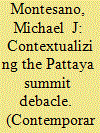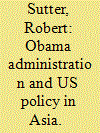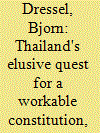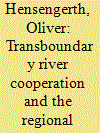|
|
|
Sort Order |
|
|
|
Items / Page
|
|
|
|
|
|
|
| Srl | Item |
| 1 |
ID:
089912


|
|
|
|
|
| Publication |
2009.
|
| Summary/Abstract |
The abrupt collapse of the ASEAN Plus Three and East Asian Summits at Pattaya on 11 April 2009 initiated four days of extreme political tension in Thailand. This tension both epitomized the current "red"-"yellow" polarization in Thai politics and society and represented the surface manifestation of deep pathologies in the Thai body politic. Four of these pathologies are the structure of the post-1997 economy, the figure of former Prime Minister Thaksin Shinawatra, the continuing war in the far south and concerns surrounding the end of the current reign. These pathologies leave Thailand in an incipient revolutionary situation, albeit one that must be clearly distinguished from the "revolution" that Thaksin tried to precipitate through street violence in April 2009. The seriousness of Thailand's pathologies notwithstanding, comparative perspectives offer the hope of peaceful progress towards the emergence of a new, more egalitarian Thailand.
|
|
|
|
|
|
|
|
|
|
|
|
|
|
|
|
| 2 |
ID:
089913


|
|
|
|
|
| Publication |
2009.
|
| Summary/Abstract |
This article examines patterns of cooperation and conflict between Indonesia and Singapore with a view to understanding why the relationship appears prone to recurrent uneasiness. It argues that we have few reasons to believe that either structural or historical factors necessarily place Singapore in a position of strategic vulnerability with regards to Indonesia. Rather, the relationship is driven by the political and material interests of actors on both sides. Contests for domestic political advantage can occasionally spill over into the bilateral arena, but they do not do so in any predetermined way. To the degree that there is a structural conflict of interests behind the relatively mundane disputes between the two countries, it is rooted patterns of economic complementarity and interaction that have operated since the colonial era. Mutual sensitivity to perceived affronts may also be a paradoxical by-product of the non-interference norm as it has been interpreted by the Association of Southeast Asian Nations.
|
|
|
|
|
|
|
|
|
|
|
|
|
|
|
|
| 3 |
ID:
089914


|
|
|
|
|
| Publication |
2009.
|
| Summary/Abstract |
As then US Defense Secretary Donald Rumsfeld stated in characteristic fashion, some security issues are easily researched and well understood, while others pose greater problems. Failure to recognize these "known knowns" and "known unknowns", or to acknowledge information gaps, can lead to misconceptions and errors of judgement. There are also mysteries - the "unknown unknowns". The study of Myanmar's armed forces (or Tatmadaw) is a case in point, yet anyone attempting to study them faces problems at three levels. At the first are the traps lying in wait for all who engage in such intellectual exercises, and strive for precision, balance and objectivity. At the second level are the challenges inherent in the study of any country's military capabilities. At the third level are the difficulties encountered by anyone studying modern Myanmar. Due mainly to the lack of reliable data, however, an accurate, detailed and nuanced assessment of Myanmar's military capabilities is currently impossible. It is difficult even to make judgements about its order of battle and defence expenditure, let alone the Tatmadaw's combat proficiency. Yet these kinds of issues are critical to an understanding of Myanmar's security
|
|
|
|
|
|
|
|
|
|
|
|
|
|
|
|
| 4 |
ID:
089911


|
|
|
|
|
| Publication |
2009.
|
| Summary/Abstract |
American preoccupation with the global economic recession and conflicts in Southwest Asia and the Middle East indicated that US relations with the rest of the Asia-Pacific region were likely to be of generally secondary importance at the start of the Obama administration. In Asia, the economic crisis put a premium on close US collaboration with the major economies, China and Japan, and on avoiding egregiously selfserving economic practices that could prompt protectionism and curb world growth. Apart from the Middle East-Southwest Asian region, the other major area of US security concern in Asia was North Korea. North Korea's escalating provocations created a major international crisis in 2009 that forced the Obama government to change priorities and give top-level attention to dealing with Pyongyang. The provocations included a long range ballistic missile test, a nuclear weapons test (North Korea's second), withdrawal from the Six-Party Talks and resumption of nuclear weapons development. Longstanding US concern with the security situation in the Taiwan Straits declined as President Ma Yingjeou reversed the pro-independence agenda of his predecessor and reassured China. The Obama government seemed poised to build on and make a few needed adjustments to Bush administration policies towards regional allies and emerging powers, China and India. Early indicators suggest that enhanced US activism and flexibility in Southeast Asia may represent a significant change in US policy in Asia under an Obama administration that otherwise seems generally inclined to adhere fairly closely to pragmatic and constructive US approaches to key Asia issues in recent years.
|
|
|
|
|
|
|
|
|
|
|
|
|
|
|
|
| 5 |
ID:
089915


|
|
|
|
|
| Publication |
2009.
|
| Summary/Abstract |
The "People's Constitution" drafted in 1997 was seen as a watershed event in Thai constitutional history due to the breadth and depth of its reforms. Yet just ten years later, in August 2007, a new Constitution was promulgated, the 18th since Thailand became a constitutional monarchy in 1932. The latest version followed the ouster in September 2006 of Prime Minister Thaksin Shinawatra in a military coup. This article examines the main differences between the 1997 and 2007 versions of the Constitution and how these changes relate to the current unrest in Thailand. The analysis suggests that Thailand's current instability is best understood in terms of how social struggles over access to power played out in constitutional choices. Though Thailand's urban elites and middle class had driven the drafting of the earlier Constitution, when the populist leadership it produced threatened their interests they were quick to support the traditional military and royal networks in ousting the elected government and replace the People's Constitution with one that is deliberately less democratic. Yet, because the drafting process failed to generate support beyond narrow elite circles, and the new institutional arrangements no longer provide the inclusive governance Thai people have come to expect, the new Constitution has generated tensions that suggest Thailand is unlikely to experience stability any time soon.
|
|
|
|
|
|
|
|
|
|
|
|
|
|
|
|
| 6 |
ID:
089917


|
|
|
|
|
| Publication |
2009.
|
| Summary/Abstract |
The article compares three cooperation projects in the Mekong River basin: the Greater Mekong Subregion, the Quadripartite Economic Cooperation initiative and the Mekong River Commission. It analyses the three projects by asking if and how they produce a regional public good. Part of the public good discussion is participatory governance, which, in natural resource management, has become a prominent proposal for enhancing the efficiency of resource management by involving all relevant stakeholders. The central question is whether participatory governance leads to the avoidance of conflict, better resource management, and thus the creation or maintenance of a regional public good. The article will address the relevance of these concepts for watershed management of the Mekong River.
|
|
|
|
|
|
|
|
|
|
|
|
|
|
|
|
|
|
|
|
|